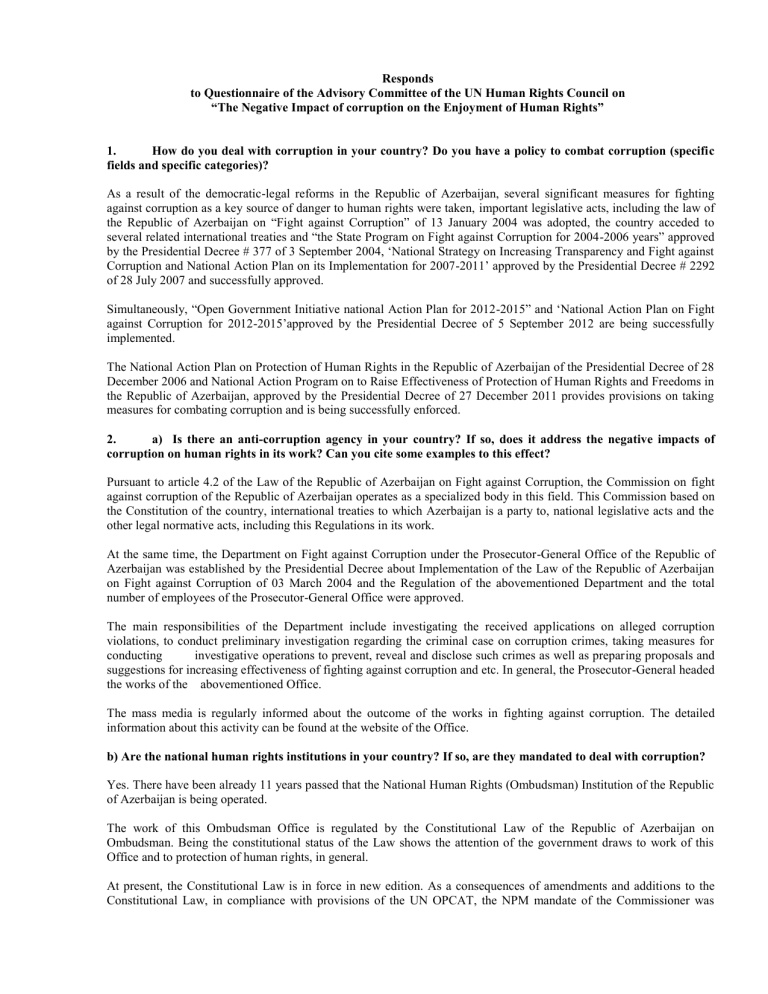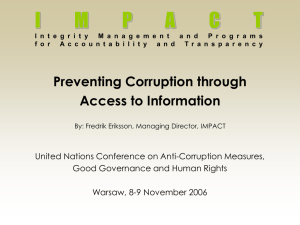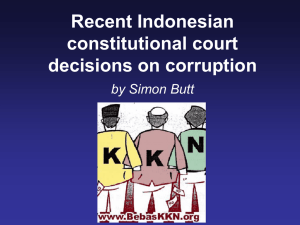Responds to Questionnaire of the Advisory Committee of the UN Human... “The Negative Impact of corruption on the Enjoyment of Human...

Responds to Questionnaire of the Advisory Committee of the UN Human Rights Council on
“The Negative Impact of corruption on the Enjoyment of Human Rights”
1.
How do you deal with corruption in your country? Do you have a policy to combat corruption (specific fields and specific categories)?
As a result of the democratic-legal reforms in the Republic of Azerbaijan, several significant measures for fighting against corruption as a key source of danger to human rights were taken, important legislative acts, including the law of the Republic of Azerbaijan on “Fight against Corruption” of 13 January 2004 was adopted, the country acceded to several related international treaties and “the State Program on Fight against Corruption for 2004-2006 years” approved by the Presidential Decree # 377 of 3 September 2004, ‘National Strategy on Increasing Transparency and Fight against
Corruption and National Action Plan on its Implementation for 2007-2011’ approved by the Presidential Decree # 2292 of 28 July 2007 and successfully approved.
Simultaneously, “Open Government Initiative national Action Plan for 2012-2015” and ‘National Action Plan on Fight against Corruption for 2012-2015’approved by the Presidential Decree of 5 September 2012 are being successfully implemented.
The National Action Plan on Protection of Human Rights in the Republic of Azerbaijan of the Presidential Decree of 28
December 2006 and National Action Program on to Raise Effectiveness of Protection of Human Rights and Freedoms in the Republic of Azerbaijan, approved by the Presidential Decree of 27 December 2011 provides provisions on taking measures for combating corruption and is being successfully enforced.
2.
a) Is there an anti-corruption agency in your country? If so, does it address the negative impacts of corruption on human rights in its work? Can you cite some examples to this effect?
Pursuant to article 4.2 of the Law of the Republic of Azerbaijan on Fight against Corruption, the Commission on fight against corruption of the Republic of Azerbaijan operates as a specialized body in this field. This Commission based on the Constitution of the country, international treaties to which Azerbaijan is a party to, national legislative acts and the other legal normative acts, including this Regulations in its work.
At the same time, the Department on Fight against Corruption under the Prosecutor-General Office of the Republic of
Azerbaijan was established by the Presidential Decree about Implementation of the Law of the Republic of Azerbaijan on Fight against Corruption of 03 March 2004 and the Regulation of the abovementioned Department and the total number of employees of the Prosecutor-General Office were approved.
The main responsibilities of the Department include investigating the received applications on alleged corruption violations, to conduct preliminary investigation regarding the criminal case on corruption crimes, taking measures for conducting investigative operations to prevent, reveal and disclose such crimes as well as preparing proposals and suggestions for increasing effectiveness of fighting against corruption and etc. In general, the Prosecutor-General headed the works of the abovementioned Office.
The mass media is regularly informed about the outcome of the works in fighting against corruption. The detailed information about this activity can be found at the website of the Office. b) Are the national human rights institutions in your country? If so, are they mandated to deal with corruption?
Yes. There have been already 11 years passed that the National Human Rights (Ombudsman) Institution of the Republic of Azerbaijan is being operated.
The work of this Ombudsman Office is regulated by the Constitutional Law of the Republic of Azerbaijan on
Ombudsman. Being the constitutional status of the Law shows the attention of the government draws to work of this
Office and to protection of human rights, in general.
At present, the Constitutional Law is in force in new edition. As a consequences of amendments and additions to the
Constitutional Law, in compliance with provisions of the UN OPCAT, the NPM mandate of the Commissioner was
2 legally regulated, also supervision over enforcement of provisions of the law of the Republic of Azerbaijan on Access to
Information and preventive functions were given to the Commissioner.
As an official functioning for prevention of human rights violations enshrined in the Constitution of the country and in international treaties to which Azerbaijan is a party to as well as rights violated by the state and local self-employment authorities and state officials, the Commissioner has own role and place in combating corruption.
Obviously, from the perspective of human rights promotion, the improving of the national legislation is significant towards combating corruption. Pursuant to article 1.8 of the Constitutional Law on Ombudsman of the Republic of
Azerbaijan, the Commissioner may submit motions to the parliament of the Republic of Azerbaijan with regard to the adoption or review of laws with a view to ensure human rights and freedoms.
Using this competency the Commissioner had several proposals such as drafting and adopting the “Code on Ethical
Behaviors of State Officials” and about amendments to the draft Law on Preventing Conflict of Interests in Activity of
State Officials and other draft laws.
For taking necessary measures in combating corruption, the Commissioner appointed specialized adviser in this regard from the employees.
The Ombudsman’s representative participated in drafting process of state programs, national strategies and plans adopted about corruption as a member of the Working Group established in order to implement activity of the
Commission on Corruption. The followings are included to these documents:
State Program on Fighting Corruption for 2004-2006 approved by the Presidential Decree of 3 September 2004;
State Program on Poverty Reduction and Economic Development in the Republic of Azerbaijan for 2008-2015 approved by the Presidential Decree of 15 September 2008;
National Strategy on Increasing Transparency and Anti-Corruption approved by the Presidential Decree 28 July
2007;
National Action Plan on Open Government for 2012-2015 approved by the Presidential Decree of 15 September
2008;
National Action Plan on Fighting Corruption for 2004-2006 approved by the Presidential Decree of 5 September
2012;
The Ombudsman Office also closely participated in drafting the National Action Plan on Protection of Human Rights approved by the Presidential Decree of 28 December 2006 and National Action Program on Raise Effectiveness of
Protection of Human Rights and Freedoms in the Republic of Azerbaijan approved by the Presidential Decree of 27
December 2011, which consists of provision on fighting against corruption.
The Commissioner is assigned to coordinate the implementation of the activity of the Working Group in National Action
Plan on Raise Effectiveness of Protection of Human Rights and Freedoms in the Republic of Azerbaijan.
There was given information about measures for fighting against corruption in the country in public hearings held each urban and rural areas of the country in order to provide active participation of the governmental authorities, various groups of population and civil society in the National Action Program and protection and monitoring of situation of protection as well as promotion of the abovementioned document.
Parliamentarians, local self-employment authorities, judiciary and law-enforcement bodies, constituencies, municipalities, local NGOs and community members took part in these events.
In the capacity of the National Human Rights Institution accredited with “A” status in accordance with Paris Principles by the UN OHCHR, the Commissioner continues her activities in better protection of human rights, improving the governance, in strengthening sustainable stability and statehood in the country. c) Do your anti-corruption agency and national human rights institutions cooperate in tackling corruption? If so, what mechanisms exist to promote cooperation between the respective institutions?
The Commissioner’s Office built effective relations with the relevant bodies towards combating corruption as an important negative impact to human rights.
3
If any information on corruption was found while analyzing the applications and requests addressed the Ombudsman, those applications were sent to the corresponding institutions and asked taking necessary measures concerned.
The Commissioner and the staff members have visited investigation isolators and places of detention in order to investigate the custody condition as well as to raise awareness of the accused persons and inmates about corruption.
During the private conversations with the accused and the suspected, they were explained their rights and freedoms, competences of the Ombudsman enshrined in the Constitutional Law concerned and provisions of the national legislation about corruption.
Simultaneously, Ombudsman and the staff members trained the listeners in the awareness-raising seminars in Academy of Justice, Police academy and training center of the General Prosecutor Office, where they told about protection of human rights and reforms taken for preventing corruption in Azerbaijan and lectured about future obligations.
The Commissioner closely cooperates with the specialized international organizations. During the period of her activity, she met with several officials of international organizations, including GRECO (Group of states against corruption) to discuss cooperation perspectives in fighting against corruption. The Ombudsman Office also collaborates with the other specialized agencies NGOs, especially the country office of the “Transparency International”, “Coalition against
Corruption”, “Network of Information and Cooperation of NGOs acting in the field of combating corruption” and with the others. The Ombudsman staff members and its regional offices will participate in the events launched by the
“Transparency International-Azerbaijan” in capital city and districts.
3.
Which measures have been adopted in your country that take into account the negative impact of corruption on the enjoyment of human rights? What are best practices and what are the challenges in this respect?
As responded previously, there was created advanced legislative framework on corruption and effective legal protection mechanisms are being successfully implemented.
“Open Government Initiative national Action Plan for 2012-2015” and ‘National Action Plan on Fight against
Corruption for 2012-2015’ are approved by the Presidential Decree of 5 September 2012. These documents provides provisions on promotion of sustainability of measures for human rights protection, improving the relevant normative legal framework and institutional mechanisms, compliance of the governmental and self-employment institutions’ activities to open government principles, extending the civil society participation in decision making process and increasing transparency and fulfilling the international obligations by the state.
Equally, additional costs of the citizens and decreasing the waste of time, achievement to respect for ethical treatment and kind behavior to citizens, increasing the professionalism, increasing entrust to the government as well as transparency, strengthening combating corruption, enlarging the usage of e-service and creating ASAN service and its branches as an Azeri brand to raise effectiveness of relevant institutional reforms should be estimated as best practice from the perspective of efficient human rights promotion.
4.
In your country, which are human rights are most affected by corruption? What specific negative impact can corruption have on the enjoyment of human rights by vulnerable groups such as women, children, and persons with disabilities, indigenous people and others?
The complains addressed the Ombudsman are mainly about corruption in registry and notary offices, municipalities, housing operations office, representative offices of administrative-territorial units of the local executive heads, health institutions especially in maternity hospitals, treatment process accompanied with surgical intervention and etc.), in secondary schools, kindergartens, tertiary and secondary vocational establishments, state registry of real estate, medicalsocial expert commissions, also in appointing of the targeted social aid.
5.
What measures can be taken by the Human Rights Council and its subsidiary bodies or by States to combat corruption with specific consideration regarding the negative impact of corruption on the enjoyment of human rights?
Using the good practices of the other countries in the field of combating corruption, the following measures can be taken:
4
to prepare suggestions and activity modules in the field of combating corruption;
to hold international conferences, seminars and trainings with participation of the specialized experts from states having good practices in the field of combating corruption;
6.
How can the United Nations human rights mechanisms be utilized for anti-corruption efforts? What other institutional mechanisms could be used to integrate a human rights-based approach in combating corruption or vice-versa at both, the international and national levels?
It can be prepared awareness-raising materials in the field of combating corruption by the UN human rights mechanisms and be dispensed through representatives of the State members. Along with this, the UN specialized agencies accredited in the member states can organize awareness-raising events for sharing best practices jointly with the local lawenforcement authorities.
It can be used of support of international and local non-governmental organizations in combating corruption.
7.
Are there any other observations or suggestions you wish to provide regarding the topic?
Finalizing the questionnaire , it may be useful to prepare educational tool of good practices of states in combating corruption .


